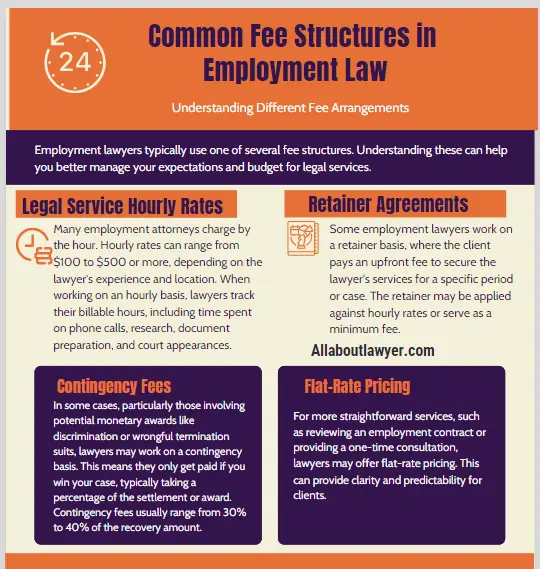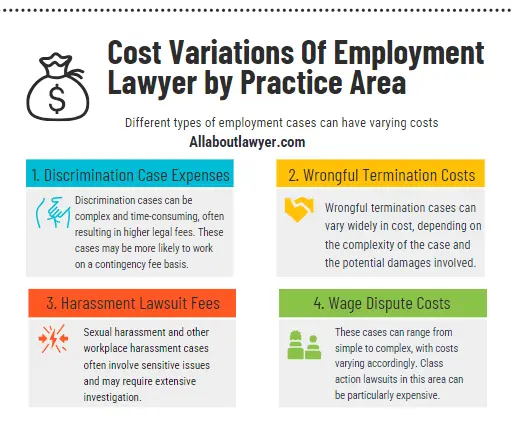How Much Does an Employment Lawyer Cost?
When facing workplace issues, many individuals find themselves in need of legal representation. However, the question that often arises is, “How much does an employment lawyer cost?” This Article will explore the various factors that influence employment attorney fees, the different fee structures available, and how to navigate the financial aspects of securing workplace legal representation.
Table of Contents
Understanding Employment Lawyer Costs
The cost of hiring an employment lawyer can vary significantly based on several factors. It’s essential to understand these variables to make an informed decision when seeking labor law counsel.
Factors Influencing Employment Attorney Fees
1. Experience and Expertise
The level of experience and expertise of the attorney plays a crucial role in determining their fees. Junior attorney rates are typically lower than those of senior counsel. Specialist lawyer charges may be higher due to their focused knowledge in specific areas of employment law.
2. Geographic Location
Urban lawyer costs often differ from rural attorney fees. Regional price variations can be substantial, with lawyers in major metropolitan areas generally charging more than those in smaller towns.
3. Case Complexity
Simple case pricing is usually lower than complex litigation costs. The more intricate and time-consuming a case is, the higher the legal fees are likely to be.
4. Type of Legal Service
Different services come with varying price tags. Consultation charges are typically lower than full litigation expenses. Mediation costs and arbitration fees may fall somewhere in between.
5. Firm Size and Reputation
Big law firm rates are often higher than those of boutique practices or solo practitioners. The prestige and resources of larger firms can command premium fees.
Common Fee Structures in Employment Law
Employment lawyers typically use one of several fee structures. Understanding these can help you better manage your expectations and budget for legal services.
1. Hourly Rates
Many employment attorneys charge by the hour. Hourly rates can range from $100 to $500 or more, depending on the lawyer’s experience and location. When working on an hourly basis, lawyers track their billable hours, including time spent on phone calls, research, document preparation, and court appearances.
2. Contingency Fees
In some cases, particularly those involving potential monetary awards like discrimination or wrongful termination suits, lawyers may work on a contingency basis. This means they only get paid if you win your case, typically taking a percentage of the settlement or award. Contingency fees usually range from 30% to 40% of the recovery amount.
3. Flat-Rate Pricing
For more straightforward services, such as reviewing an employment contract or providing a one-time consultation, lawyers may offer flat-rate pricing. This can provide clarity and predictability for clients.
4. Retainer Agreements
Some employment lawyers work on a retainer basis, where the client pays an upfront fee to secure the lawyer’s services for a specific period or case. The retainer may be applied against hourly rates or serve as a minimum fee.

Additional Costs to Consider Of Employment Lawyer
Beyond the lawyer’s fees, there are often additional expenses associated with employment cases. These can include:
– Court filing fees
– Expert witness costs
– Document preparation charges
– Deposition expenses
– Travel costs (if applicable)
– Photocopying and postage fees
It’s important to discuss these potential additional costs with your lawyer upfront and understand how they will be billed.
Handling the Cost of Employment Legal Services
While the cost of an employment lawyer can be significant, there are strategies to manage these expenses effectively.
1. Initial Consultation Fees
Many employment lawyers offer free or low-cost initial consultations. This can be an opportunity to discuss your case, understand potential costs, and determine if the lawyer is a good fit for your needs.
2. Fee Transparency
Reputable lawyers will be transparent about their fees and billing practices. Don’t hesitate to ask for fee estimates, itemized invoices, and cost breakdowns. This transparency can help you budget and avoid unexpected charges.
3. Payment Options
Discuss payment options with your lawyer. Some may offer payment plans to make their services more accessible. In certain cases, lawyers may consider sliding scale fees based on your income.
4. Pro Bono Services and Legal Aid
For those who cannot afford standard legal fees, pro bono services or legal aid options may be available. Many lawyers dedicate a portion of their time to pro bono work, and there are organizations that provide free or low-cost legal services to qualifying individuals.
5. Cost-Benefit Analysis
Before proceeding with legal action, conduct a cost-benefit analysis. Consider the potential outcomes of your case and weigh them against the expected legal costs. This can help you make an informed decision about whether to pursue legal action.
Understanding the Value of Legal Representation
While the cost of an employment lawyer is an important consideration, it’s also crucial to understand the value they provide. A skilled employment attorney can:
– Protect your rights in the workplace
– Negotiate better settlements
– Navigate complex legal procedures
– Provide expert advice on employment laws
– Represent you effectively in court or mediation
When considering the long-term financial impact of an employment dispute, the cost of legal representation may be a worthwhile investment.
Comparing Costs: Big Law vs. Boutique Practices
The size and type of law firm can significantly impact costs. Here’s a general comparison:
Big Law Firms:
– Higher hourly rates (often $300-$1000+)
– More resources and support staff
– May have higher overhead costs
– Often handle high-stakes, complex cases
Boutique Practices:
– Generally lower hourly rates (often $150-$500)
– More personalized service
– May have lower overhead costs
– Often specialize in specific areas of employment law
Solo Practitioners:
– Often have the lowest hourly rates (can be as low as $100-$300)
– May provide more flexible fee arrangements
– Direct contact with your attorney
– May have limited resources for complex cases
Cost Variations Of Employment Lawyer by Practice Area
Different types of employment cases can have varying costs:
1. Discrimination Case Expenses
Discrimination cases can be complex and time-consuming, often resulting in higher legal fees. These cases may be more likely to work on a contingency fee basis.
2. Wrongful Termination Legal Costs
Wrongful termination cases can vary widely in cost, depending on the complexity of the case and the potential damages involved.
3. Harassment Lawsuit Fees
Sexual harassment and other workplace harassment cases often involve sensitive issues and may require extensive investigation, potentially increasing costs.
4. Wage and Hour Dispute Costs
These cases can range from simple to complex, with costs varying accordingly. Class action lawsuits in this area can be particularly expensive.

The Impact of Case Duration on Employment Lawyer Costs
The length of your case can significantly impact the overall cost. Factors that can extend case duration include:
– Complexity of legal issues
– Amount of evidence to be gathered and reviewed
– Court backlogs and scheduling
– Willingness of parties to negotiate or settle
Longer cases generally result in higher legal fees, especially when working with an attorney charging hourly rates.
Strategies for Managing Legal Costs
To keep your legal costs under control, consider these strategies:
1. Be Organized
Provide your lawyer with all relevant documents and information in an organized manner. This can reduce the time they need to spend sorting through your case.
2. Communicate Efficiently
While it’s important to keep your lawyer informed, try to consolidate your communications. Instead of frequent short calls, schedule longer, more comprehensive discussions.
3. Understand Billing Practices
Know what you’re being billed for. Some lawyers charge for every phone call or email, while others may have different practices.
4. Consider Alternative Dispute Resolution
Mediation or arbitration can often be less expensive than going to trial. Discuss these options with your lawyer.
5. Be Realistic About Your Case
Listen to your lawyer’s assessment of your case. Pursuing a weak case can be costly and unproductive.
Conclusion
The cost of an employment lawyer can vary widely based on numerous factors, including the lawyer’s experience, location, the complexity of your case, and the fee structure used. While legal representation can be expensive, it’s often a necessary investment to protect your rights and interests in the workplace.
When seeking an employment lawyer, it’s crucial to discuss fees upfront, understand all potential costs, and consider the value that expert legal representation can provide. By being informed and proactive, you can make the best decision for your specific situation and budget.
Remember, while cost is an important factor, it shouldn’t be the only consideration when choosing an employment lawyer. The right attorney can make a significant difference in the outcome of your case, potentially providing value that far exceeds their fees.
FAQs
1. What is the average hourly rate for an employment lawyer?
The average hourly rate for an employment lawyer can range from $200 to $400, but rates can be lower or higher depending on location, experience, and firm size.
2. Do employment lawyers offer free consultations?
Many employment lawyers offer free initial consultations, but this varies by attorney. Some may charge a nominal fee for the first meeting.
3. Can I get an employment lawyer on a contingency fee basis?
Yes, some employment lawyers work on contingency for certain types of cases, particularly those involving potential monetary awards like discrimination or wrongful termination suits.
4. How much does it cost to sue an employer?
The cost to sue an employer can vary widely, from a few thousand dollars for simple cases to tens or hundreds of thousands for complex litigation. Factors include case complexity, duration, and whether it goes to trial.
5. Are there any low-cost alternatives to hiring an employment lawyer?
Yes, alternatives include legal aid societies, pro bono services, law school clinics, and government agencies like the Equal Employment Opportunity Commission (EEOC).
Visit All About Lawyer for more guide articles.
About the Author

Sarah Klein, JD, is a former employment attorney who has advised clients on wrongful termination, workplace discrimination, wage disputes, and employee rights. At All About Lawyer, she writes practical, legally sound guides to help workers understand labor laws and stand up for fair treatment at work.
Read more about Sarah
